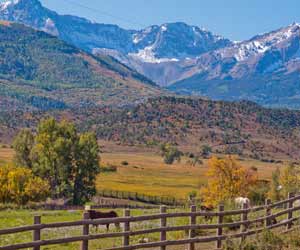A Brief History of Dude Ranching
Dude ranching evolved from several different sources over a period of about 50 years, starting in the mid eighteen hundreds. Two of the origins of this business were the northern Rocky Mountain hunting expedition, and the southwest plains cattle ranch.
In the Rocky Mountains, local settlers commonly acted as guides to immigrants, “travelers-for-pleasure,” and especially hunters. Development of railroads west brought increasingly easier access, and by the 1850s, the number of eastern hunters arriving had increased to the point where the guiding expeditions of hunters had developed into an industry of its own, with a number of companies established.

By 1869, a number of these expedition companies built permanent hunting camps and guest lodges. These lodges served as the owner’s permanent year-round homes, base camp for expeditions, and the place where customer-hunters could safely leave their spouses while they hunted. Satisfied customers often returned every year to their “second home out west.”
At the same time, the post-Civil War cattle boom added another dimension to the west, with buffalo, longhorns, cowboys, wranglers, and ranchers. As the industrializing east required more beef, the cattle industry spread across the southwestern plains.
Life on the plains was isolated and lonely. Early ranchers had few close neighbors, and gladly welcomed visitors, eager to meet and talk to strangers, hungry for news and companionship.
It was not uncommon for ranchers to develop longstanding relationships with sportsmen. The rancher provided the board, lodging, a horse, and hunting (or fishing) grounds close to the comfort of the lodge; the sportsmen provided news, conversation, companionship, and game for the table.
By the 1890s, guest business had grown to the point where dudes were a permanent, significant factor in the operation of the ranch. The Custer Trail Ranch was known as a “place where easterners of the better and more influential classes, more particularly of the younger generation, could build themselves up mentally and physically through the association with nature.”


 Teach English in Asia
Teach English in Asia  Cruise Ship Jobs
Cruise Ship Jobs  Alaska Fishing Industry Jobs
Alaska Fishing Industry Jobs  Sharing Economy / Gig Economy
Sharing Economy / Gig Economy